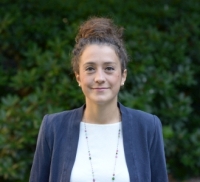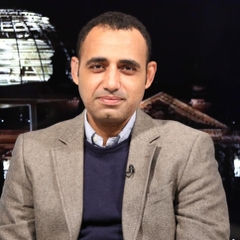Lectures
Lectures
Fellows in this fellowship series deliver public lectures at Durham University. These lectures will be developed into an edited volume to be published upon the completion of the fellowship series. In the meantime, papers usually based on these lectures will be published in the Durham Middle East Papers series by the Institute for Middle Eastern and Islamic Studies.
2024
The 2024 Mohamed Ali Foundation fellowship lectures will take place on Thursday 20th June 2024 at 12.00 o’clock in School of Government and International Affairs, Durham University, Al Qasimi Building, Elvet Hill Road, Durham DH1 3TU, UK, Room IM102 (Ground Floor).
The lectures will also be live-streamed on Zoom: if you wish to attend online please register here. The lectures are open to the public and attendance is free. For more details please see here.
Prof. LUCIA CARMINATI

Lucia Carminati is a historian of migration and the modern Middle East. She researches the social and cultural history of Egypt in the 19th and 20th centuries. Her latest work explores the ambivalent history of Egypt’s borders. It takes off in 1875, when the so-called Mixed Tribunals were founded, and ends with the abolishment of the capitulations in 1937. She examines the history of state efforts aimed at regulating movement, keeping people in or locking them out, welcoming certain goods and prohibiting others. On the other hand, she explores the efforts of border-crossers and the hindered trajectories of certain goods as they traversed borderlands that were slowly but surely morphing into borders. She strives to understand the history of the Egyptian state and society itself in light of the movements in and out of their edges.
Dr XIAOYUE LI

Xiaoyue Li’s research focuses on the development of both the public and private railway sectors during Khedive Abbas Hilmi II’s reign from 1892 and 1914. It explores the interplay of materiality, technology, capitalism, and politics that railways assembled. Taking an infrastructural approach, his study accentuates the multilayered politics in motion at the British Empire’s frontier that oscillated between modernity and indigeneity, capitalization and decolonization, autocratic reality and democratic ethos. Specifically using the archives of Abbas Hilmi II, Prof. Li further reveals the crucial roles of the Khedive and Egyptian bureaucrats in restructuring Egypt’s railway system in a period overshadowed by British financial advisors and engineering administrators.
Details of past fellows follow below.
2023
The Last Khedive but the First to Decolonize?: Abbas Hilmi II’s odyssey for sovereignty
DR KARIM MALAK

Dr Karim Malak explores the nature of Egyptian Sovereignty at the turn of the 19th century. Challenging the narrative that sees the Egyptian state emerge after 1919, Malak traces its birth to increasingly assertive policies and reforms that began under Mehmet Ali and Ibrahim Pasha, which were stunted by the British but later picked up by Khedive Abbas Hilmi II. Asking what were the limits and opportunities for governance afforded within competing visions of Ottoman and British sovereignty, Malak will concentrate particularly on accounting and financial reform, military bureaucracy, and that of the awqāf; the key battlegrounds for Egyptian sovereignty between the 1870s and 1914 when an earlier undertheorized epoch of decolonization began.
Failed attempts at making Abbas Hilmi II king of Syria (1930-1933)
DR SAMI MOUBAYED

Dr Sami Moubayed analyses the brief proposal of Abbas Hilmi II as a king of Syria in 1932, and places this incident in context with the legacy and ambitions of his ancestor Mohammad Ali Pasha, who intervened in Syria in the early 19th century, and with the short reign of Faisal I after the First World War. He reflects on how this nomination was received by different groups in contemporary Syria and by Abbas Hilmi II himself, and considers what policies might have been adopted by such a ruler.
The last khedive of Egypt and Germany: transnational networks, empire, and independence, 1914-1919
DR TAQADUM AL-KHATIB

Dr Taqadum Al-Khatib explores why after his deposition and during much of the First World War Abbas Hilmi II remained the object of substantial attention lavished on him by the Great Powers. He reviews Germany’s relations with Egypt both before and after the British occupation in 1882 and the pan-Islamic anti-colonial policies that Germany adopted after 1914, tracing its increased engagement with and patronage of Egyptian nationalists in Europe and Egypt. Drawing upon extensive use of German archival sources, as well as Abbas Hilmi II’s own archive, he examines the wartime inter-relations between Egyptian nationalists, Abbas Hilmi II, the Ottoman state and Germany. Germany and Turkey professed support for combined military operations to liberate Egypt, but Egyptian nationalists remained sceptical. The talk ultimately offers a new understanding of the roots of the idea of the Third World.
- The last khedive of Egypt and Germany: transnational networks, empire, and independence, 1914-1919 (video)
2019
The archives of the last khedive of Egypt. Making the most of the Abbas Hilmi II Papers.
PROF. PASCALE GHAZALEH

Professor Ghazaleh’s inaugural lecture in the fellowship series explored the significant research potential of the papers of Abbas Hilmi II (1874-1944), presenting a broad overview of the collection and its strengths and drawing out some of its highlights, contextualising these with other collections in the region and existing historiography. An outline of a future edited volume is presented, with suggested chapter themes. The riches of the Abbas Hilmi II Papers should be better known and Professor Ghazaleh’s lecture opened a new field of discovery for modern historians of Egypt.
Inaugural lecture: Archives of the last khedive (lecture) (pdf)
